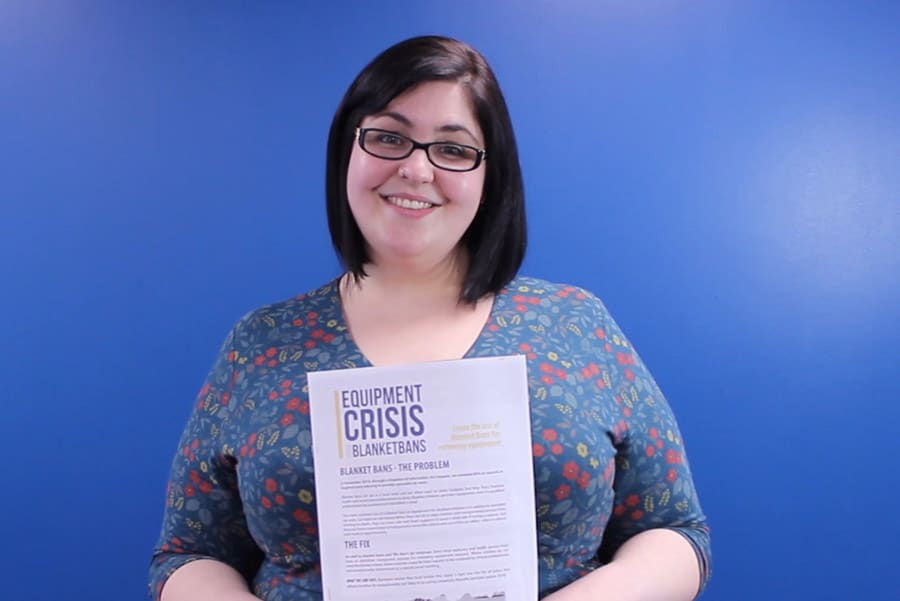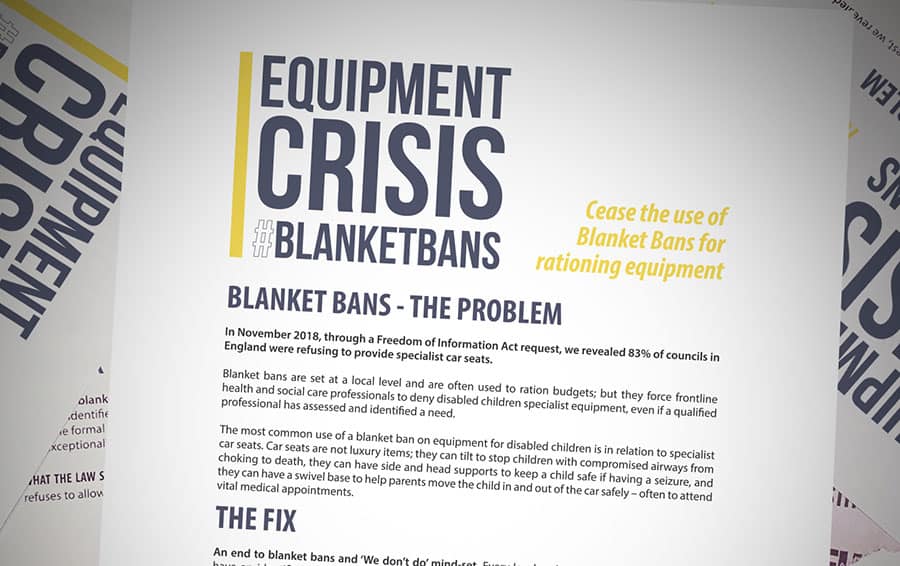Over 300,000 disabled children still at risk by unlawful blocks on vital disability equipment states report
New data shared by Newlife the Charity for Disabled Children has revealed that more than 300,000 disabled children in the UK are still affected by potentially unlawful restrictions by local authorities on the provision of disability equipment.
The charity found that 50 percent of local councils are still blocking the provision of specialist car seats for disabled children through the use of ‘blanket bans’, meaning the council has a policy to deny certain types of equipment ‘under any circumstance’.
These rigid policies, which Newlife has warned are challengeable in law, are contrary to the rights of disabled children outlined in the Chronically Sick and Disabled Persons Act (1970) and Children’s Act (1989) alleges the charity, emphasising that the policies put vulnerable children at risk of serious injury or even death.
According to the disabled children’s charity, the most prevalent use of a blanket ban today is the widespread refusal of councils to fund specialist car seats to children who have a clear medical or safety need identified by a qualified professional. These specialised seats are required to keep children with musculoskeletal disorders, seizure disorders or a compromised airway safe.
“Although there has been a clear improvement in the number of children now affected by blanket bans, the fact is that as many as 302,223 children are still at risk. Will it take a fatality for these councils to recognise their legal duty to provide the equipment needed to keep these children safe?” commented Clare Dangerfield, Campaigning and Public Affairs Manager at Newlife.
“It’s simply not acceptable for councils to use to blanket ban policies to push costs back onto parents. While a standard car-seat costs just £100, the kind of adapted seat required by disabled and terminally ill children can cost up to 35x as much. Forcing parents to cover the cost of equipment denied by their council due to austerity measures drives families into poverty.”
It is not just specialist car seats that are subject to the provision ban however, with Newlife confirming that it identified blanket bans on walking frames, specialised buggies, arm supports and high-sided safety beds.
“Policies like these also cause incredible amounts of unnecessary suffering,” continued Clare.

“Recently, a mum told us she had to sedate her son to get him into his car seat for journeys to the doctor, due to the extreme pain he faced otherwise. Another child who had severe autism was denied a ‘safespace’ high-sided bed, and so banged his head so hard that his retinas detached. All because of restrictive, unnecessary blanket bans. This is just not acceptable.”
Alongside the blanket bans, the charity also highlighted that there is no national legal maximum waiting time, with many areas failing to meet their own practise guideline or emergency equipment response, leaving disabled children in pain or at risk while they wait for prescribed equipment.
As a result, Newlife the Charity for Disabled Children says it has provided equipment to more than 1200 families in crisis in the past year alone, granting equipment with a total value of over £1,100,000 to ensure vulnerable children are not left at risk of catastrophic injury or even death.
“For as long as local authorities continue to use ‘blanket ban’ policies, Newlife will continue to challenge these potentially unlawful practices; support families through our services, cut through local authority red tape and provide emergency equipment to keep children safe,” asserted Sheila Brown OBE, Co-Founder and CEO at Newlife.
“The goal of all our work is to ensure that every single one of the UK’s 1.1 million disabled and terminally ill children are able to live a life without unnecessary pain or suffering – a basic right that every single child deserves.
“Newlife exists because if it was your child, you would want the best for them and that’s what we are working for every day.”
The findings come 12 months after Newlife’s ‘Fix the Four’ report which first exposed the impact that blanket ban policies have on children and families across the UK. A Freedom of Information Act request by the charity identified 83 percent of councils in England were refusing to provide specialist car seats, potentially affecting 568,826 disabled children in 2018.
Since 2018, Newlife has been working alongside local authorities across the UK to overturn these blanket bans and improve disability equipment provisions for children, with 40 percent fewer local authorities using blanket bans compared to November 2018.
https://thiis.co.uk/report-indicates-hundreds-of-thousands-of-children-at-risk-by-unlawful-blocks-on-vital-disability-equipment/https://thiis.co.uk/wp-content/uploads/2019/11/blanket-ban-newlife.jpghttps://thiis.co.uk/wp-content/uploads/2019/11/blanket-ban-newlife-150x150.jpgGovernment & Local AuthoritiesNewsroomReports & ResearchSector NewsThird Sectorarm supports,blanket ban,Children’s Act (1989),Chronically Sick and Disabled Persons Act (1970),Clare Dangerfield,disability equipment,Fix the Four,high-sided bed,local authorities,local councils,Newlife the Charity for Disabled Children,safespace,specialised buggies,specialist car seats,walking framesNew data shared by Newlife the Charity for Disabled Children has revealed that more than 300,000 disabled children in the UK are still affected by potentially unlawful restrictions by local authorities on the provision of disability equipment. The charity found that 50 percent of local councils are still blocking the...Calvin BarnettCalvin Barnettcalvin.barnett@bhta.comAuthorTHIIS Magazine


